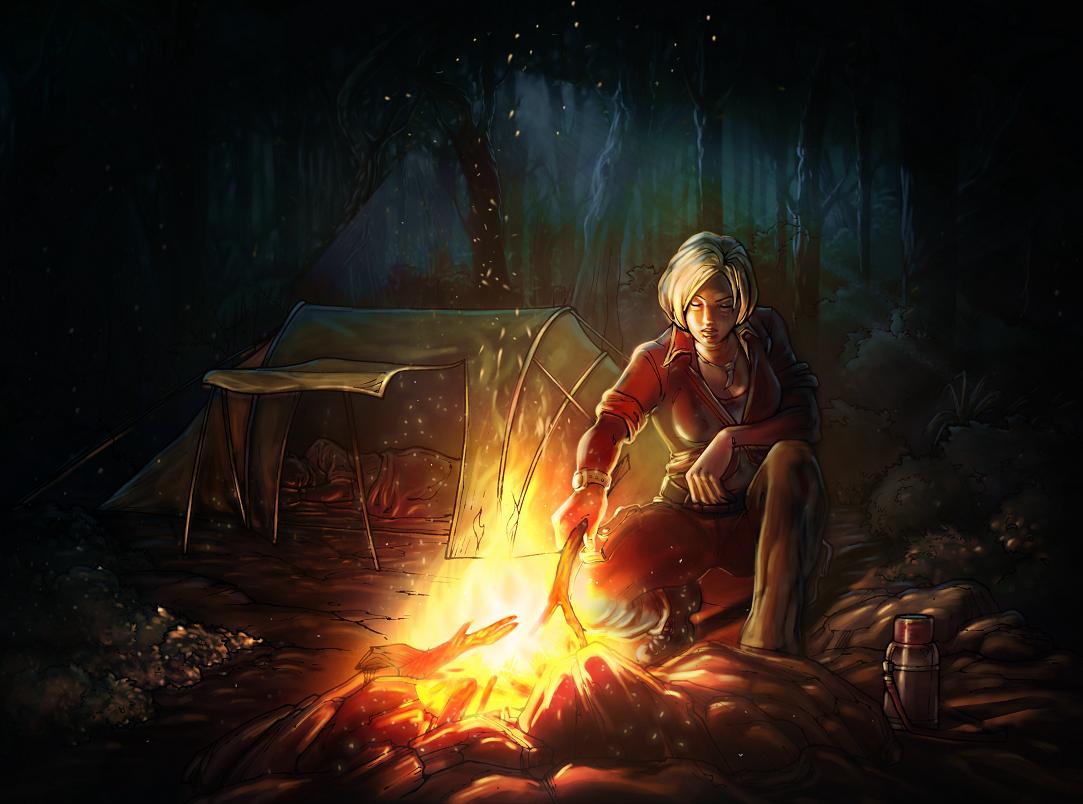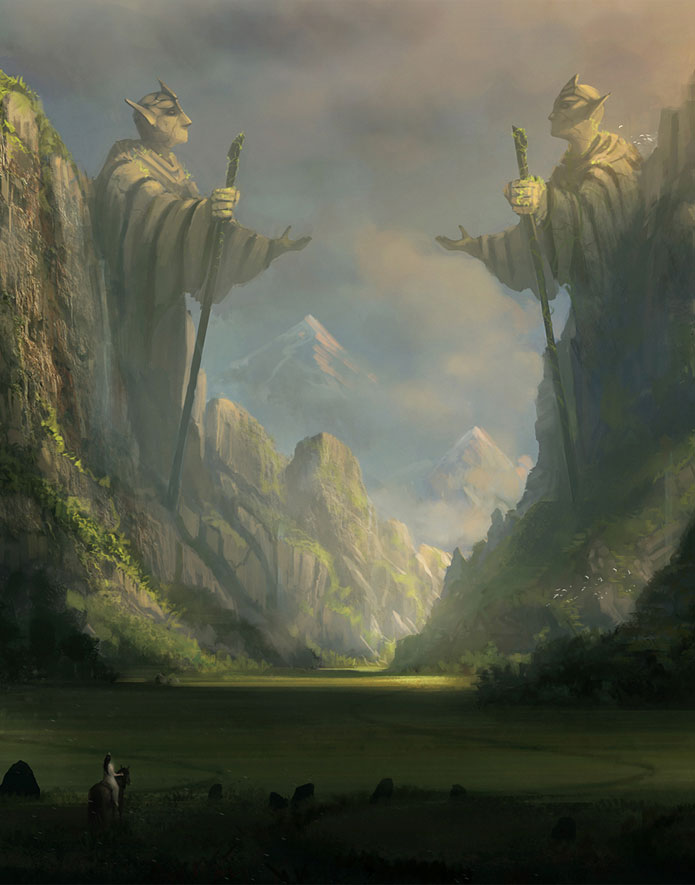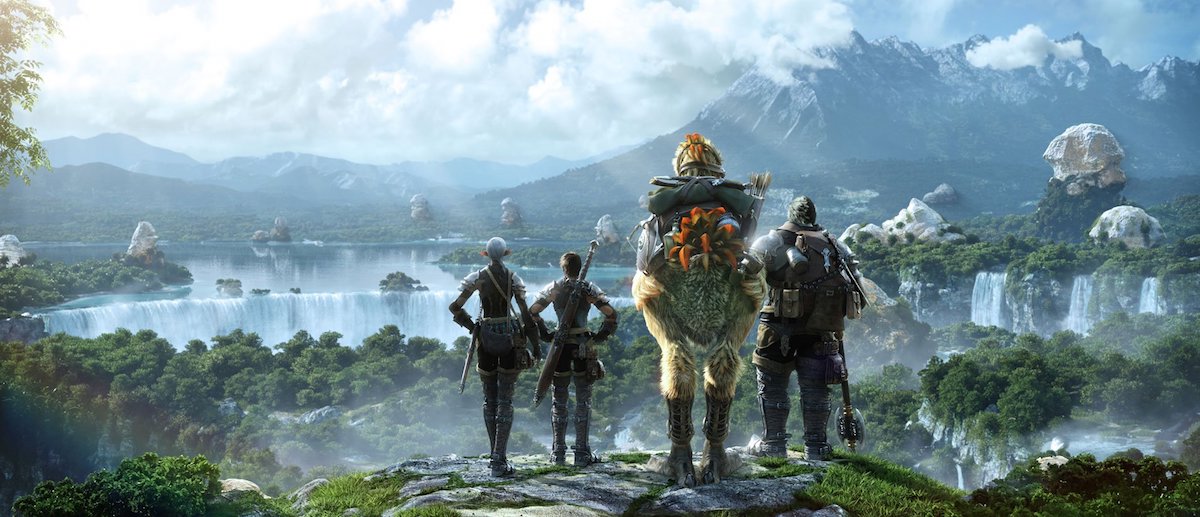Wilderness Exploration
Even the most deadly villains cannot compare to the dangers and disasters that can befall an adventurer caught unprepared in the Wilderness. Attempting to leave civilization can be fraught with peril, but it can also lead to vast wealth and incredible rewards. Where will your exploration lead?
Three Phases of Travel
In gameplay, each day while traveling overland can be separated into three functional parts: Travel, Camping, and Resting. The choices that characters make during these three phases directly impacts their success - and the dangers that they face - as they explore the wilds.
The Travel Phase
The majority of your time spent in the wilds will likely be on the move, so it's important to set your target from the time that you leave civilization. During the Traveling Phase, characters will resolve (1) Seasonal Weather/Moon Cycle, (2) Travel Pace, (3) Navigation, and (4) Scouting and Travel Encounters.
Maps
Any well-prepared adventurer should have a map - without one you'll quickly become lost. The DM should provide the party with a hex map of the region that they're traveling in. This map can come from a wandering merchant, a helpful questgiver, or "hand drawn" by a knowledgeable PC... but without one the party will have to resort to aimlessly wandering the wilderness - a tedious affair.
For the purposes of this ruleset, a single Hex should represent about 7 miles.
Seasonal Weather and Moon Cycle
The first step every day is to determine the weather and moon cycle. See the rules found after the Resting Phase.
The group must then continue by traveling in a cardinal direction, continuing to make Survival or Investigation checks for every hex that they pass into. Only on a successful check do they discern their location on the map, potentially miles from their goal.
The Camping Phase
Even while overlanding, there are still opportunities to slow down and take care of your basic human needs. This is what's represented in the Camping Phase -- hunting & foraging, cooking, setting up tents and bedrolls. During the Camping Phase, characters will resolve (1) any Camping Activities, and (2) their Rations Supply.
Camping Activities
During the Camping Phase, characters can undertake different activities to help provide for the group. Each character only has time for one activity, but any character can use their one activity to Help another character:
- Scouting for a campsite -- Campsite Check
- Building a makeshift shelter -- Makeshift Shelter Check
- Foraging for supplies -- Forage Check
- Other downtime activities
Scouting a Campsite: Campsite Check
There are many different types of campsites that can be found in the wilderness, depending on the needs of the party. Some are open and exposed, allowing the group to easily spot an approaching threat. Others are sheltered, allowing for ample protection from the weather.
When scouting a campsite, the character chooses a campsite from the table below, then makes either a Intelligence (Investigation) or Wisdom (Survival) check to determine if they can find that type of campsite. The DM can raise or lower the DC according to the terrain. For example, you might be able to find water in the desert by scouting out a unique oasis, but it's probably much more difficult than DC 5.
On a failed check, or if no character scouts for a campsite, the party camps in a Rocky Field.
Campsite Table
| Campsite | DC | Effect |
|---|---|---|
| Rocky Field | NA | Disadv. on Forage check +4 to Night Encounter roll |
| Near Fresh Water | 5 | -5 DC on Forage check +4 to Night Encounter roll |
| Tree Stand (shelter) | 10 | +4 to Night Encounter roll |
| Small Clearing | 10 | +1 to Night Encounter roll Adv. on Watch checks |
| Verdant Field | 10 | +1 to Night Encounter roll Adv. on Forage checks |
| Hilltop | 15 | Adv. on Watch checks Adv. on Forage checks |
| Old Tower (shelter) | 15 | Adv. on Watch checks |
| Farmhouse (shelter) | 20 | Adv. on Ration Die rolls |
| Cave (shelter) | 20 | -4 to Night Encounter roll |
Makeshift Shelter: Shelter Check
When their campsite doesn't afford natural shelter, a character can attempt to build a shelter for up to six characters by making either an Intelligence or Dexterity check based on the following table.
Makeshift Shelter Table
| Shelter Size | DC |
|---|---|
| Shelter for 1 character | 5 |
| Shelter for 2-3 characters | 10 |
| Shelter for 4 characters | 15 |
| Shelter for 5+ characters | 20 |
On a failed check, the character builds a structure capable of sheltering only the number of characters corresponding to one step lower on the table than what was attempted.
Foraging for Supplies: Forage Check
A character can attempt to forage or hunt for extra rations by making either an Wisdom (Survival) or Wisdom (Animal Handling) check based on the availability of resources as determined by the below chart. Characters can discern the DC for their current location on a successful DC Intelligence (Nature) check.
If successful, they can reroll a 1 or 2 on their daily Rations Die roll. If a character rolls a natural 20, they can increase their Rations Die by one size. If they are on their last ration or they do not have any rations remaining, a successful check counts as consuming one ration for that day.
Food and Water Availability
| Terrain Characteristics | DC |
|---|---|
| Abundant food and water sources | 10 |
| Limited food and water sources | 15 |
| Very little, if any, food and water sources | 20 |
Other Downtime Activities
The Camping Phase, in total, lasts over the course of about 2 hours in game-time as the sun is setting. This is a good opportunity for a character to perform other tasks, such as copying spells into a spellbook, crafting (provided they have the appropriate materials), or other roleplaying scenarios.
Rations Supply - The Rations Die
The wilds are a dangerous place, and oftentimes the amount of supplies needed to survive the elements can vary from day to day. The Rations Die is a method of tracking the amount of resources that you have remaining without requiring strict bookkeeping. At the end of the Camping Phase, every character must roll the Rations Die to determine how many supplies they have remaining.
The Rations Die in Action
Instead of tracking each individual ration, each character starts with a d12 — this is your Rations Die. While you're away from civilization, roll it at the end of every day: if you roll a 1 or 2, the die gets one size smaller:
If characters successfully Foraged for Supplies, they may reroll a 1 or a 2. If they rolled a natural 20 on their Forage Check, they may increase their Rations Die size by 1 step.
If you are down to one ration and you use it, that's it — you've consumed everything, so completely remove your Rations Die from your inventory.
Rations Die Table
| Die Size | Remaining Uses* (avg.) | Die Size | Remaining Uses* (avg.) |
|---|---|---|---|
| d12 | 6 | d6 | 3 |
| d10 | 5 | d4 | 2 |
| d8 | 4 | 1 | 1 |
Running out of Rations
If a character does not have any rations to consume during the Camping Phase, they gain one level of Exhaustion.
Replenishing Rations
To increase your Rations Die you can:
- purchase new rations from any civilized location,
- receive rations from someone else,
- forage for more supplies (natural 20)
- or cast certain spells.
Purchasing Rations
Even the smallest villages have enough rations to replenish a group of adventurers to a full d20 Rations Die. In order to increase your Rations Die by one step, you must pay a number of gp according to the below table.
Rations Cost Table
| Current Rations Die | Cost to Increase Size by 1 (gp) | Cost to Increase to d12 (gp) |
|---|---|---|
| d12 | NA | NA |
| d10 | 6 | 6 |
| d8 | 5 | 11 |
| d6 | 4 | 15 |
| d4 | 3 | 18 |
| 1 | 2 | 20 |
| 0 | 1 | 21 |
Receiving Rations from Someone Else
Characters can exchange rations freely, however to do so the player giving the supplies must decrease their Rations Die by one step, allowing the character who receives the supplies to increase their Rations Die by one step.
It's possible to find rations on defeated enemies, or in supply caches around the world. In such cases, the DM determines how many characters can increase their Rations Die, and by how many steps.
The Resting Phase
After a long day of travel, nothing is more important than getting a good night of sleep. And yet, sometimes the worst dangers come out in the cover of night. The group will need to remain vigilant if they hope to survive.
Fire
The first decision to be made is whether or not the group wants to keep a fire. Without a fire, any creature without Darkvision suffers Disadvantage on their Watch check. However, a fire can also bring the consequences of attracting undue attention. Any time the party keeps a fire, the DM adds +1 to the Encounter Roll.
Additionally, a fire might be advisable in cold or rainy weather (see Blizzard, Thunderstorm, and Freezing Cold).
Keeping Watch: Watch Check
Keeping watch is an important part of staying safe throughout the night. If the characters do not keep watch, then any creatures that they encounter will be able to sneak up on them unaware, almost ensuring their demise. The number of watches, the number of people on each watch, and how long each watch lasts is all determined by the players.
While on watch, the character makes a Wisdom (Perception) check to determine if they sense any approaching threat. Certain campsite locations can provide advantage on this roll.
Encounters while Resting
The DM will determine if there are any Encounters while resting by rolling a D20, and adding any modifiers from their campsite location or use of a fire. On a 10 or less, the night passes uneventfully.
On a result greater than a 10, the DM will roll again randomly determine which watch the encounter occurs in.
Typically, an encounter won't last long enough to seriously disrupt a character's long rest. Once the encounter is over, the watches may resume until the morning.
Waking Up
After all watches have been completed, the whole
party receives the benefits of a Short or Long Rest, depending on whether the party is in an Arcane Field (see below). They then begin again with the Traveling Phase for a new day.
Exhaustion and Lingering Injuries
When traveling through the wilderness for extended periods of time, characters are likely to get beaten, bruised, and downright tired. The following rules provides a way to keep track of just how beaten up and tired characters get while making wilderness travel more suspenseful by forcing characters to make many difficult choices in the Traveling, Camping, and Resting Phases.
Exhaustion
Some special abilities and environmental hazard can lead to a special condition called exhaustion A character may become exhausted because:
- They ran out of rations
- They are traveling quickly in Heavy Rain, Snow, Blizzard, or Thunderstorm weather conditions
- They spend the night in a Blizzard or Thunderstorm without shelter and a fire
- They spend the day in Freezing Cold or Scorching Heat weather conditions
- They suffer a Lingering Injury
Exhaustion is measured in six levels. An effect can give a creature one or more levels of exhaustion, as specified in the effect’s description.
Exhaustion Table
| Level | Effect |
|---|---|
| 1 | Disadvantage on Ability Checks |
| 2 | Speed halved |
| 3 | Disadvantage on Attack rolls and Saving Throws |
| 4 | Hit point maximum halved |
| 5 | Speed reduced to 0 |
| 6 | Death |
If an already exhausted creature suffers another effect that causes exhaustion, its current level of exhaustion increases by the amount specified in the effect’s description.
A creature suffers the effect of its current level of exhaustion as well as all lower levels. For example, a creature suffering level 2 exhaustion has its speed halved and has disadvantage on ability checks.
An effect that removes exhaustion reduces its level as specified in the effect’s description, with all exhaustion effects ending if a creature’s exhaustion level is reduced below 1.
A creature’s exhaustion level is reduced by 1 whenever they complete up to 8 hours of rest, provided that the creature has also ingested some food and drink. Also, being raised from the dead reduces a creature's exhaustion level by 1.
Lingering Injuries
A character suffers a lingering injury when:
- They take a critical hit
- They drop to 0 hit points but are not killed outright
- They fail a death saving throw by 5 or more
Whenever a creature suffers a lingering injury, they gain 1 level of exhaustion.


Seasonal Weather and Moon Cycles
Moon and Season Cycles
The moon phase determines how much light there is at night. The moon's light is imbued with life-giving magic, the total absence of which plunges the world into magical darkness.
Many monsters and beasts are attuned to the moon cycle, so any would-be adventurers should be wary of traveling at certain times of the month.
Moon Cycle Table
| Cycle Day | Moon Phase | Amount of Light at Night |
|---|---|---|
| 1 | New Moon | Magical Darkness (Lv. 2) |
| 2-12 | Waxing Crescent | Darkness |
| 13-14 | Near Full | Dim Light |
| 15 | Full Moon | Magical Daylight (Lv. 3) |
| 16-17 | Near Full | Dim Light |
| 18-28 | Waning Crescent | Darkness |
Seasons and Soltices
Each season lasts for exactly one moon cycle. The yearly cycle of the sun also makes for two special days of the year: the Winter Solstice and the Summer Solstice.
-
Winter Solstice -- on the day of the Winter New Moon, the sun does not rise in the sky, nor does it even hover close to the horizon. Because this day always coincides with the New Moon, the world is plunged into 24 hours of magical darkness.
-
Summer Solstice -- on the day of the Summer Full Moon, the sun never sets, and the Full Moon joins her in the sky to produce 24 hours of magical daylight.
Weather Conditions
The weather may be normal, extreme, or strange, and each type differs depending on the season.
To determine the weather for the day, at the start of each day roll a d100 and consult relevant seasonal table.
Variant: Slowly Changing Weather.
Alternatively to making it full random, you can simply have the result move one step up or down the seasonal table if you roll higher or lower. If you are rolling multiple times per day, this will provide smoother climate transitions.
Winter
| d100 | Weather Type | Weather |
|---|---|---|
| 1-10 | Extreme (Winter) | Freezing Cold |
| 11-20 | Extreme (Winter) | Blizzard |
| 21-50 | Normal (Winter) | Snow |
| 51-98 | Normal (Winter) | Clear Skies |
| 99 | Extreme (Spring) | Thunderstorm |
| 100 | Strange | Strange Phenomena |
Spring
| d100 | Weather Type | Weather |
|---|---|---|
| 1-5 | Extreme (Winter) | Blizzard |
| 6-20 | Normal (Spring) | Snow |
| 21-80 | Normal (Spring) | Clear Skies |
| 81-94 | Normal (Spring) | Heavy Rain |
| 95-99 | Extreme (Summer) | Thunderstorm |
| 100 | Strange | Strange Phenomena |
Summer
| d100 | Weather Type | Weather |
|---|---|---|
| 1-10 | Extreme (Summer) | Scorching Heat |
| 11-20 | Extreme (Summer) | Thunderstorm |
| 21-50 | Normal (Summer) | Heavy Rain |
| 51-98 | Normal (Summer) | Clear Skies |
| 99 | Extreme (Fall) | Blizzard |
| 100 | Strange | Strange Phenomena |
Fall
| d100 | Weather Type | Weather |
|---|---|---|
| 1-5 | Extreme (Summer) | Thunderstorm |
| 6-20 | Normal (Fall) | Heavy Rain |
| 21-80 | Normal (Fall) | Clear Skies |
| 81-94 | Normal (Fall) | Snow |
| 95-99 | Extreme (Winter) | Blizzard |
| 100 | Strange | Strange Phenomena |
Normal Weather
Clear Skies (All seasons)
Clear skies during the day and a view of the stars at night.
Heavy Rain
- Either your travel pace is slowed by 1 hex, or take a level of Exhaustion.
- If you attempt to take a rest without shelter, you must make a DC 10 Constitution saving throw to gain its benefits.
Snow
- Either your travel pace is slowed by 1 hex, or take a level of Exhaustion.
- If you attempt to take a rest without shelter and a fire, you must make a DC 10 Constitution saving throw to gain its benefits.
Extreme Weather
Freezing Cold (Winter only)
Frostbite-inducing cold that can be deadly.
- At the end of the day, characters must make a DC 14 Constitution saving throw or take 3d4 cold damage and take a level of Exhaustion. Characters have advantage if they have shelter and a fire at the end of the day.
- Cold damage rolls get +4. Fire damage rolls get -4.
Blizzard
Thick snow falls, making travel extremely uncomfortable.
- Each character that travels during a blizzard must roll a d100. On a 1 or 2, the character got lost and split from the rest of the group because of the heavy snowfall. They must perform the Camping and Resting Phase alone that night.
- Either your travel pace is slowed by 1 hex, or take a level of Exhaustion.
- If you rest without shelter and fire, you must make a DC 12 Constitution saving throw to gain its benefits.
- Cold damage rolls get +2. Fire damage rolls get -2.
Thunderstorm
Lightning flashes and thunder crashes.
- Each character that travels during a thunderstorm must roll a d100. On a 1, the character is struck by lightning, dealing 2d12 lightning damage. On a 100, the character is struck by lighting but is unharmed -- instead, all their attacks do an added +2 lightning damage for 24 hours.
- Either your travel pace is slowed by 1 hex, or take a level of Exhaustion.
- If you rest without shelter and fire, you must make a DC 12 Constitution saving throw to gain its benefits.
- Lightning and thunder damage rolls get +2.
Scorching Heat (Summer only)
Blistering heat that can be deadly.
- At the end of the day, characters must make a DC 14 Constitution saving throw or take 3d4 fire damage and gain a level of Exhaustion. Characters have advantage if they spend a Rations Die.
- Fire damage rolls get +4. Cold damage rolls get –4.
Strange Phenomena
The world is a weird place. The DM may either have the players roll or choose a story-specific phenomena.
Strange Phenomena Table
| d6 | Phenomena |
|---|---|
| 1 | Volcanic Eruption |
| 2 | Solar Eclipse |
| 3 | Northern Lights |
| 4 | Meteor Shower |
| 5 | Malevolent Storm |
| 6 | Wild Magic Storm |
Volcanic Eruption
Heavy white clouds of swirling smoke fill the sky, and it rains ash that coats everything in little flecks. The smell of sulphur permeates the air.
- If party is >10 miles from a mountain, nothing happens.
- If party is <10 miles, the DM initiates a skill challenge.
Solar Eclipse
For 8 hours during the day, it becomes night. The DM will either select a dramatic time or randomly determine it.
Northern Lights
Strange swirls of green, blue, and purple fill the sky. For seven nights, these lights shed magical dim light (Lv. 3) when the weather is not Heavy Rain, Blizzard, or Thunderstorm.
Meteor Shower
Stars begin to fall from the sky as lumps of stone and metal.
- All creatures gain 1 luck point as per the Lucky feat, which lasts until used or for 24 hours.
- Roll d100. On a 1, a meteor hits d6-1 miles away in a d8 direction, causing 10d6 bludgeoning damage in 100 ft. radius. On a 100, one character gets a Wish.
Malevolent Storm
A mysterious thunderstorm seems to seek creatures out.
- Same as a Thunderstorm but roll the d100 three times.
- In addition, on a 2-10 for any of these rolls, the characters are attacked by Air Elementals.
Wild Magic Storm
Fluctuations in the weave drive strange phenomena across the world. Rail falls upwards, plants bloom unseasonably, and people everywhere see apparitions of the dead and gone.
- There is a high chance of encounters with sentient plants, ghosts, and strange illusions.
- All spells cast are naturally upcasted by 1 level, but trigger a Wild Surge as per a Wild Magic Sorcerer class feature.
Resting Rules - Gritty Realism and "Arcane Fields"
While traveling on the Lord's Road, the party decides to rest for an hour while a storm rages outside the cave where they shelter. Though its a temporary respite, the party finds that their injuries from their last combat don't heal as quickly as they thought they would.
Deep in an underground cavern rife with monsters, the party can feel a gentle arcanic, almost-electric buzz permeating the air. They stop to dress their wounds for a moment, but find that their magic quickly regenerates and their wounds have healed into scars in a mere hour.
This variant rule presents the concept of a "magic field" and a dichotomy -- two different durations for short/long rests depending on whether the party is in a Arcane Field.
Arcane Fields
There are areas of ambient arcane energy like the above-described all over the world, some naturally occurring and others created by creatures. They are called "arcane fields."
Adventurers aren't the only creatures attracted to these areas. Monsters, beasts, and shady individuals are all drawn to these fonts of raw arcane energy. This often explains why characters find an abundance of rare monsters in these areas. The type of monsters inhabiting a particular area will often depend on the source of that area's arcane energy.
Like many adventures, creatures are empowered by the arcane energy found in these fields. They can often take on forms or perform feats that they could never do in non-magical areas.
The Source of Arcane Fields
There are a variety of magics that will result in the existence of an arcane field.
In some, the source of the arcanic energy is naturally occurring. The source might be a magical artifact lost to time, whose long-time presence in the area has led to a build up of arcane energy. Or, the source of magic may be a pristine cavern waterfall whose sheer wildness has rendered the area a holy site of the nature gods. Sometimes, even just the presence of an extra-planar or especially magical creature may render the area magical, as this creature is so brimming with arcane energy that it overflows into its surroundings.
Alternatively, the various races have all developed methods to create an arcane field from scratch by channeling the power of their gods. Usually, this is done through the construction and blessing of a shrine, temple, or statute. This takes much time, effort, and arcane knowledge to do. Yet, almost every town of at least a certain size has such an arcane channel, meaning almost every town is a magic field. This can often have the unfortunate side effect of attracting frequent attacks by various monsters.
Lastly, most people growing up have heard legends of dark rituals that can instantaneously generate an arcane field.
Discerning Arcane Fields
Characters can always discern when they are in these areas, as they feel an overwhelming weight of arcane energy permeating the very air and empowering their abilities.
However, characters can usually not tell why the area is magical -- i.e. what the source of magic is. This can be important because the type of objects, monsters, beasts, and evil creatures inhabiting the area will usually depend on why the area is magical.
Characters can attempt to discern this on a DC 10 or 15 skill check, depending on the following. The character rolls a d20 and chooses either their Arcana, History, Nature, or Religion proficiency to add to the roll, depending on their guess for the source of the magic:
- Arcana -- the source is some type of powerful energy eminating from either a creature or a ritual being performed.
- History -- the source is a long-lost magical artifact whose energy has built up over time.
- Nature -- the source is a wild area untouched by anything but the nature gods.
- Religion -- the source is some connection to a god and its worshippers.
If the character guesses the correct proficiency (as determined by the DM), the DM will not tell the character that they guessed correctly. Instead, in secret the DM will add the character's chosen proficiency bonus to the roll and check it against a DC 10. If the character guesses wrong, the DM will not add any proficiency, checking the bare roll against DC 15.
Resting Durations
The duration required for a short/long rest will depend on whether the characters are in an arcane field when they take their rest.
Resting in Arcane Fields (Normal)
While in an arcane field, the magic energy infusing the area causes the party's wounds to heal much quicker:
-
In magic fields, it takes 1 hour to complete a short rest and 8 hours to complete a long rest.
-
All the normal rules for resting still otherwise apply.
Resting Outside Arcane Fields (Gritty Realism Variant)
Outside of arcane fields, the party's wounds heal slowly:
-
Outside of deep fields, it takes 8 hours to complete a short rest and 24 hours to complete a long rest.
-
All the normal rules for resting still otherwise apply.
Revised Backgrounds, Features & Spells
Background Features
The following Background Features are adjusted as follows:
Outlander - Wanderer
- You have an excellent memory for maps and geography, and you can always recall the general layout of terrain, settlements, and other features around you.
In addition, you can find food and fresh water for yourself and up to five other people each day, provided that the land offers berries, small game, water, and so forth.- While lost, you have advantage on the Navigation check to refind your location.
- In addition, when you successfully forage for food, up to 5 creatures can make their Rations Die rolls at advantage.
Fisher - Harvest the Water
- You gain advantage on ability checks made using fishing tackle. If you have access to a body of water that sustains marine life, you can maintain a moderate lifestyle while working as a fisher,
and you can catch enough food to feed yourself and up to ten other people each day.- ...and when you successfully forage for food, up to 10 creatures can make their Rations Die rolls at advantage.
Class Features
The following Class Features are adjusted as follows:
Ranger - Natural Explorer
Even when you are engaged in another activity while traveling (such as foraging, navigating, or tracking), you remain alert to danger.- In the Travel Phase, you may be nominated to be both the Guide and the Scout.
If you are traveling alone, you can move stealthily at a normal pace.- If you are traveling alone, you gain the advantages of a Slow Pace even while traveling at a Normal Pace.
When you forage, you find twice as much food as you normally would.- When you succeed on a forage check, you do not need to roll your Rations Die for that day.
Spells
Casting certain spells can aid you in your exploration of untamed lands. The following spells bypass the use of your Rations Die, or even increase it in certain situations.
Create Food and Water
You create 45 pounds of food and 30 gallons of water on the ground or in containers within range, enough to sustain up to fifteen humanoids or five steeds for 24 hours. The food is bland but nourishing, and spoils if uneaten after 24 hours. The water is clean and doesn't go bad.
- When cast, up to 15 creatures do not need to make a Rations Die check for that day.
Create or Destroy Water
You create up to 10 gallons of clean water within range in an open container. Alternatively, the water falls as rain in a 30-foot cube within range, extinguishing exposed flames in the area.
- When cast to create 10 gallons of water during the day, reduce the Foraging DC for up to 10 creatures by 5.
Goodberry
Up to ten berries appear in your hand and are infused with magic for the duration. A creature can use its action to eat one berry. Eating a berry restores 1 hit point, and the berry provides enough nourishment to sustain a creature for one day.
The berries lose their potency if they have not been consumed within 24 hours of the casting of this spell.
- ...most of the nourishment needed to sustain a creature for one day. Any creature that consumes a Goodberry can reroll a 1 or a 2 on their Rations die once.

Wilderness Encounter Table
| d100 | Type | Encounter | Notes |
|---|---|---|---|
| 1 | Merchant | Tortle(s) | DC 5 Scout/Watch check if not on road |
| 2 | Merchant | Dwarve(s) | DC 5 Scout/Watch check if not on road |
| 3 | Merchant | Half-Orc(s) | DC 5 Scout/Watch check if not on road |
| 4 | Merchant | Elves | DC 5 Scout/Watch check if not on road |
| 5 | Merchant | Human(s) | DC 5 Scout/Watch check if not on road |
| 6 | Good Event | Wagon Trouble | No check required |
| 7 | Good Event | Good Omen | No check required |
| 8 | Good Event | Naked Gnome | No check required |
| 9 | Good Event | Fields of Berries | No check required Increase all Rations Die by 1 size |
| 10 | Good Event | Hidden Cache | DC 15 Scout/Watch check |
| 11 | Friendly Group | Experienced Adventurers | No check required May provide one magical item |
| 12 | Friendly Group | Ranger + Animal Companion | DC 20 Scout/Watch check If failed, Ranger steathily follows party for a while |
| 13 | Friendly Group | Traveling Priestess | No check required DM determines religion and why she's traveling |
| 14 | Friendly Group | Big Game Hunters | DC 10 Scout/Watch check Party may spot a herd before/after encounter |
| 15 | Friendly Group | Military Scouts | DC 10 Scout/Watch check Provides news of nearby evil creatures |
| 16 | Friendly Group | Traveling Farmer | No check required Provides local nature lore -- get adv. on Forage rolls that day |
| 17 | Friendly Group | Innocuous Wild Animal | DC 15 Scout/Watch check If failed, will burst through path/camp |
| 18 | Friendly Group | Refugees | No check required If party donates enough food/clothing, may provide one magic item |
| 19 | Friendly Group | Human Knight Party | No check required They are searching for a wanted criminal whose description matches a member of the party |
| 20 | Friendly Group | Elven Nobles Party | DC 10 Scout/Watch check They'd prefer to avoid the party |
| 21 | Friendly Group | Rowdy Bard Party | No check required Can be convinced to sing a song for the party |
| 22 | Friendly Group | Dwarven Paladin Party | No check required |
| 23 | Friendly Group | Wandering Elf Druid | DC 15 Scout/Watch check |
| 24 | Friendly Group | Traveling Human Wizard | DC 15 Scout/Watch check Tries to hide using illusion magic |
| 25 | Friendly Group | Half-Orc Clerics | No check required Can be convinced to heal party members |
| 26 | Friendly Group | Friendly Outlaw Rogue | DC 20 Scout/Watch check If failed, may follow the party and try to pickpocket Either way, will try to sell valuable stolen goods for super cheap |
| 27 | Friendly Group | Traveling Monks | No check required |


| Type | Encounter | Notes | |
|---|---|---|---|
| 28 | Friendly Group | Goliath Barbarian Nomads | No check required |
| 29 | Friendly Group | Nondescript Old Man (Sorcerer) | No check required If bullied, will attack |
| 30 | Place | Recent Battlefield | No check required |
| 31 | Place | Burn-Scarred Ruins | DC 10 Scout/Watch check |
| 32 | Place | Abandoned Shrine | DC 10 Scout/Watch check |
| 33 | Place | Semi-abandoned Shrine | DC 10 Scout/Watch check |
| 34 | Place | Dig Site | No check required |
| 35 | Place | Old Statute | No check required |
| 36 | Place | Druid Grove | DC 15 Scout/Watch check |
| 37 | Place | Glowing Pond | DC 20 Scout/Watch check One magic item on bottom of pond |
| 38 | Side Quest Hook | TBD | Campaign-specific quest |
| 39 | Side Quest Hook | TBD | Campaign-specific quest |
| 40 | Side Quest Hook | Vows Are Pacts, Too | Spiritual quest |
| 41 | Side Quest Hook | The Dead Druid | Spiritual quest |
| 42 | Side Quest Hook | The Slavers | Search and Destroy quest |
| 43 | Side Quest Hook | The Sacked Village | Search and Destroy quest |
| 44 | Side Quest Hook | The Cavern | Item retrieval quest |
| 45 | Side Quest Hook | The Killing Field | Item retrieval quest |
| 46 | Side Quest Hook | The Curious Incident of the Night Dog | Mystery quest |
| 47 | Side Quest Hook | The Crashed Airship | Mystery quest |
| 48 | Side Quest Hook | The Tower of Dread | Rescue mission |
| 49 | Side Quest Hook | The Farmer's Daughter | Rescue mission |
| 50 | Bad Event | Heavy Fog | Disadv. on all Travel, Camping, and Resting Phase checks Visibility is reduced to 50 ft. until the next day |
| 51 | Bad Event | Impassible Cliff | The party must return to the hex it came from before continuing to travel |
| 52 | Bad Event | Whispersing Woods | Series of d4+1 trees fall on party DC 12 Dexterity saving throw or 2d8 damage |
| 53 | Bad Event | Physical Traps | Series of d4+1 hidden traps (DC 15 Scout Check) DM chooses why these traps are here |
| 54 | Bad Event | Magical Traps | Series of d4+1 hidden traps (DC 15 Scout Check) DM chooses why these traps are here |
| 55 | Bad Event | Sinkhole | Skill Challenge |
| 56 | Bad Event | Earthquake | Skill Challenge |
| 57 | Bad Event | Forest Fire | Skill Challenge |
| 58 | Bad Event | Stampede | Skill Challenge |
| 59 | Bad Event | Avalanche/Mudslide (depending on season) | Skill Challenge |
| 60 or above |
Combat | Random or Campaign-Specific (DM's choice) |
Difficulty/creatures depends on: - Current terrain/season -PC level and # of PCs -how many combat encounters since last long rest |


Credits
WotC
"Wilderness Exploration Revised" is unofficial Fan Content permitted under the Fan Content Policy. Not approved/endorsed by Wizards. Portions of the materials used are property of Wizards of the Coast. ©Wizards of the Coast LLC.
Art
- Page 1: A Realm Reborn by Bert Mailer
- Page 2: Elf by Raelynn Huenefeld
- Page 4: Concept Art by abhi_shekv
- Page 5: Through the Ancient Valley by JJCanvas
- Page 6: Camp Cook's Kitchen Pack by Frost River
- Page 7: Fantasy Landscape by Jason Coates
Inspiration/Credits
- Inspiration and mechanics for the Rations Die come from u/giffyglyph and their Ammunition Die mechanic.
- u/stirls101 came up with almost all of rules for the Travel/Camping/Resting phases. I just tweaked them and added a couple things.
- The rules for weather conditions is adapted from rules originally created by u/KibblesTasty. I modified them to fit in with u/stirls101's exploration rules and tweaked them a bit.
- The idea for Arcane Fields came from u/JohnnyBigBonesDM, who first suggested using different resting rules for overland travel vs. dungeoncrawling.




